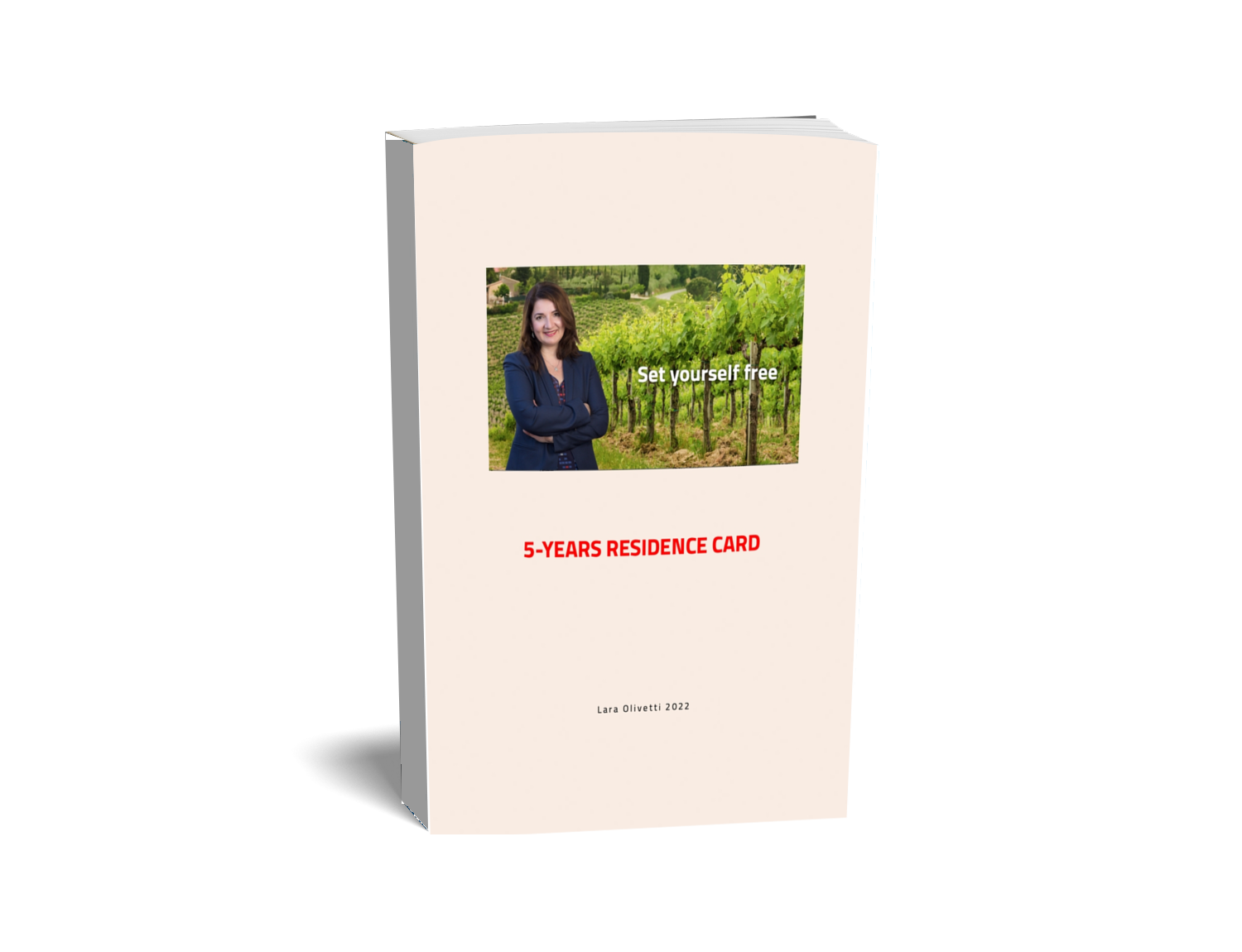You don’t need to wait for Italian citizenship to stay in Italy and enjoy an unlimited right of residence. All family members of Italian citizens have a right to reside in Italy, no matter what their nationality.
Family members – spouse or partner, children up to 21 years old and the partner’s children, grandchildren, parents, grandparents… – have a right to a residence permit. After five years, they have a right to permanent residence.
Which family members are entitled to a Residence Card?
- Spouses and partners
- Children of the couple (until 21 years of age)
- Children of the Italian citizen or of the non-Italian spouse or partner (until 21 years of age)
- Children above 21 years of age, if maintained by the Italian citizen
- Parents, if maintained by the Italian citizen
- Grandchildren and grandparents of the Italian citizen
- The parent’s of the Italian citizen’s spouse (or same-sex registered partner)
Example:
The parents of a Chinese daughter who resides in Italy and is married (or registered in a same-sex partnership) with an Italian citizen have a right to enter (visa-free) and stay in Italy under option #6. If their daughter has children in Italy, the right of said parents to enter and stay in Italy falls additionally under option #5.
Basis: Article 2 of Italian Legislative Decree of February 6th, 2007 no. 30
Did you know that…?
> Since February 2017 Italy has extended the right to citizenship and all residence rights to same-sex spouses/partners.
> The right of residence extends to any other of the 27 states which are part of the European Union. You can take up residence and stay as long as you wish, no matter if you work, study or enjoy your retirement. That is the core of family rights for every Italian (thus European) citizen.
How does it work?
Just move to Italy with your Italian family member.
In some cases, you may need a visa to move to Italy. That depends on your nationality. Find out here how to obtain a visa.
Once in Italy, you will register with the immigration authorities (Questura). I have a tip for you: sometimes the Italian authority grants a temporary “Family Residence Permit” to the family members of Italian citizens.
That is a 2-years residence permit called Permesso di Soggiorno per Motivi Familiari.
This permit is enough for family members to access health care coverage, work, study, and travel visa-free to the other 27 European Union member states.
However, this type of permit has some distinct disadvantages. It doesn’t allow you to:
… stay in any other European Union member state after three months;
… work or study in any other European Union member state, even on a temporary basis;
… enjoy any social/healthcare benefit in any other European Union member state;
… avoid a time-consuming renewal process: every second yearyou must undergo a full review of requirements and documents which takes months.
Is there an alternative?
Yes. My advice is to opt for a RESIDENCE CARD.
In fact, family members to Italian citizens (or to any other European Union citizen) have a right to a long-term residence card. Besides, after 5 years of residence in Italy, you are entitled to a permanent card. In Italian, it is officially called “Permesso di soggiorno per familiari di cittadino comunitario”.
A Residence Card is a special treat for the family members because the family is so important in Italy.
As a family member of an Italian citizen, you are eligible for the 5-years residence card and have free access to work, business, studies, health care, and most rights on a par with Italian citizens.
Italian authorities tend to give a 1 or 2-year “Family Residence Permit” if you don’t insist on a 5-year Residence card. That might have to do with the fact that a Residence Card sets you free from bureacratic renewal procedures for a long time and enjoys benefits for at least five years. But the law is on your part. So it’s up to you to claim your rights and demand a Residence Card.
Residence cards for Italian citizens’ family members are free of charge.
How can you obtain a Residence Card?
You just hand to the local immigration office the following:
A copy of your passport (show the original)
An official certificate proving that you are a family member (e.g. a marriage certificate)
Copy of your Italian family member’s id card
Documents of your income, showing that your family have a sufficient income and do not have to depend on the public security (you don’t ned to have a job for that)
Remember: Residence cards are for families residing in Italy. In order to obtain it, both you and your Italian citizen family member need to move to and reside in Italy.
Alternatively, you can have a similar residence card if you move with your Italian family member to another country within the European Union.
For parents:
In case the applicant is the parent of an Italian citizen or of the Italian citizen’s spouse (or same-sex registered partner) as per categories #4 and #6 above, additional documents are required to prove that the applicant is partly or totally maintained by the concerned child (i.e. the Italian citizen or of the Italian citizen’s spouse or same-sex registered partner). This requirement is called “Vivenza a carico”.
Viable documents to this end are bank statements showing that the concerned child sent money to the parent, tax reports, and statements by accountants, as well as any other official statement from Italy or from the authorities of the applicant’s country of origin/residence. Such documents should be translated into Italian and legalized by the Italian Consulate.
Alternatively, the parent may first apply for a residence permit for family reasons and the child should add the parent to the Italian tax report for that year. The following year, the Italian tax report will be accepted as a sufficient document to obtain a 5-year residence card.
In some circumstances, the parents of minors with Italian citizenship can be granted a residence permit, even if they do not live together. In that case, it is important to show the authorities both proof of family tie (the child’s birth record showing parentship) and of the parent’s right of shared custody or visit.
Now it’s your turn…
Let me know with your comment on this page: how does this information work for you?
Which other information would be useful for you to know?
Free compact guide SPECIAL RESIDENCE CARD KEY
Are you interested to know more about some requirements for the residence card?
You can receive more information about sufficient income limit to apply for a residence card, or the conditions to keep or lose your card, or how you can obtain a Residence Card if you settle in another country in Europe.
I put this information together in a compact guide: SPECIAL RESIDENCE CARD KEY. If you want to have it for free, ask for it and I will send it to you shortly by email.

Special Residence Card Key

Great information. Please send the additional information
May I have a copy if your SPECIAL RESIDENCE CARD KEY?
Thank you.
The Special Residence Card Key is on its way to your inbox
How do you call this special residency permit in Italian?
Can I please have a copy of Special Residence Card Permit? Thank you
“Carta di soggiorno per familiari di cittadini comunitari”, according to Articles 3 and 23 of the Decreto Legislativo no. 30/2007. We sent the Special Residence Card Key to your email.
Hi Lara, I’ll be entering Italy again this month. I was about to convert my PDS (student to spouse) but I had to go out of Italy so I think there’s a difference on how the procedure will be. What residence permit should I apply if I have an Italian spouse? Is it the permesso di soggiorno per familiari? Would this permit allow me to work in Italy also? Thank you so much!!!!
If your previous residence permit expired while you are outside of Italy, you may apply for a visa prior to entry, if that is required for your nationality. As a spouse of an Italian national residing in Italy, after your entry, you may apply for that permesso di soggiorno per motivi familiari or for a 5 years residence card.
Hi Lara, I have a Carta di Soggiorno di Familiare, I have been in Italy married to an Italian citizen 5yrs now. I just realized my card expires in a few weeks (end of the month), how do I go about renewing it and can get a permanent card?
You should take an appointment with the local immigration office (Questura) as soon as possible. At the appointment, you will bring all the requested documents. For example, this is the list for the Questura of Trento.
Hi I made a permesso di sogorno of 5 years for my mother in milano but now I am living in England and she is in Addis Ababa Unfortunately the situations there are very bad Wright now I need her to get out but her papers have expired. How can I get it renewed ?I am in London.Please help!
Unfortunately, there is no chance to renew a residence permit after it has expired and the person is residing outside of Italy. If you have Italian citizenship, you can obtain a visa to Italy and a residence permit for your mother provided that you register your residence in Italy.
Hi Lara, I am a UK citizen married to an Italian Citizen. If I apply for a Family Residence Card in Italy will I be able to spend time in both the UK and Italy. In otherwords, can I live in 2 places and not be in breach of the Residence Card conditions.
You can, if you stay in Italy for at least half of the duration period of your residence card. Each passage across the Schengen border is recorded.
Hello,
I would like to know if i can reside in another Eu country alone without my Italian wife if i have a permanent residence card of a family member issued after the 1st 5 years of marriage?
In principle, you cannot just reside outside of Italy with an Italian residence card. You only have a right to stay up to 90 days. However, if you have you have independent means of supporting yourself, or a job there, if you can show that you have a 5 years residence card, you can obtain a permanent residence card from the authorities of your new country of residence. In that case, you can stay independently of your Italian spouse (Article 18 and following of the European Union Directive 2004/38/EC of the European Parliament and of the Council of 29 April 2004 on the right of citizens of the Union and their family members to move and reside freely within the territory of the Member States).